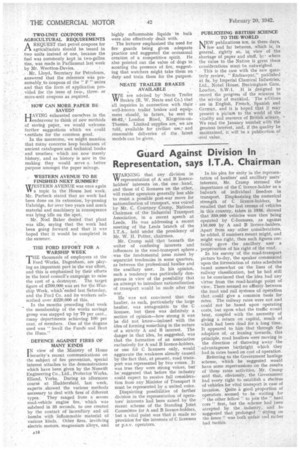Guard Against Division In Representation, says LTA. Chairman
Page 18

If you've noticed an error in this article please click here to report it so we can fix it.
WARNING that any division in 1!V representation of A and B licenceholders' interests on. the one hand, and those of C licensees on the other, will render operators generally less able to resist a possible post-war move for nationalization of transport, was voiced by Mr. C. Courtney Cramp, National Chairman of the Industrial Transport Association, in a recent speech at Leeds. He was addressing a recent meeting of the Leeds branch of the I.T.A., held under the presidency of Mr. W. H. Potter, chairman.
Mr. Cramp said that beneath the welter of confusing interests and influences in the road-transport sphere was the fundamental, issue raised by -separatist tendencies in some quarters, as between the professional haulier and the ancillary user. In his opinion, such a tendency was particularly dangerous in view of the possibility that an attempt to introduce nationalization of transport would be made after the war.
He was not convinced that the haulier, as such, particularly the large haulier, was antagonistic to the C licensee, but there was definitely a section of opinion—how strong it was he did not know—imbued with the idea of forming something in the nature of a strictly A and B interest. The danger in that idea, he suggested, was thai the formation of an association exclusively for A and B licence-holders, or one for C licensees only, would aggravate the weakness already caused by the fact that, at present, road transport was represented by two voices. It was true they were strong voices, but' he .suggested that before the industry could expect to receive full consideration from any Minister of Transport it must be represented by a united voice.
Disquieting possibilities of further division in the representation of operators' interests had been raised by the recent scheme of the Standing Joint Committee for A and B licence-holders, but a vital point was that it made no provision for the interests of C licensees or p.s.v. operators. In his plea for unity in the representation of hauliers' and ancillary users' . interests, Mr. Cramp stressed the importance of the C licence-holder as a bulwark of individual freedom in transport. Einplaasizing the numerical strength of C licence-holders, he recalled that the last census of vehicles ,in this country, taken in 1938, showed that 350,000 vehicles were then being operated by C-licensees, as against 150,000 by A and B licence-holders. Apart from any other consideration's, he added, if numbers meant might, and might was right, then such figures certainly gave the ancillary user a perpetuation of his right of the road. In his survey of, the road-transport picture 'to-day, the speaker commented upon the formulation of rates schedules based somewhat on the lines of the railway classification, but he had still to be convinced that the idea had any virtue from the road-haulage point of view. There seemed no affinity between the road and rail systems of operation that could give a common basis for rates. The railway rates were not and could not be based upon operating costs, but upon what the traffic would bear, coupled with the necessity of giving a return on capital, much of which had been dead for a long time. It appeared to him that through the adoption of, or leaning towards, this principle, road hauliers were moving in , the direction. of throwing away the advantageous birthright which they had in rates based on cost of -operation.
Referring to the Government haulage scheme, which he suggested would have some repercussions on the results of these rates activities, Mr. Cramp said that, obviously, the Government had every right to establish a Trude-us of vehicles for vital transport in case of invasion. Quite is good. proportion of operators seemed to be waiting for " the other felloW " to jointhe " hard core " first, but the .scheme had been accepted by the industry, and he suggested that prolonged " sitting on the fence " was both linfair an rather bad tacties.




















































